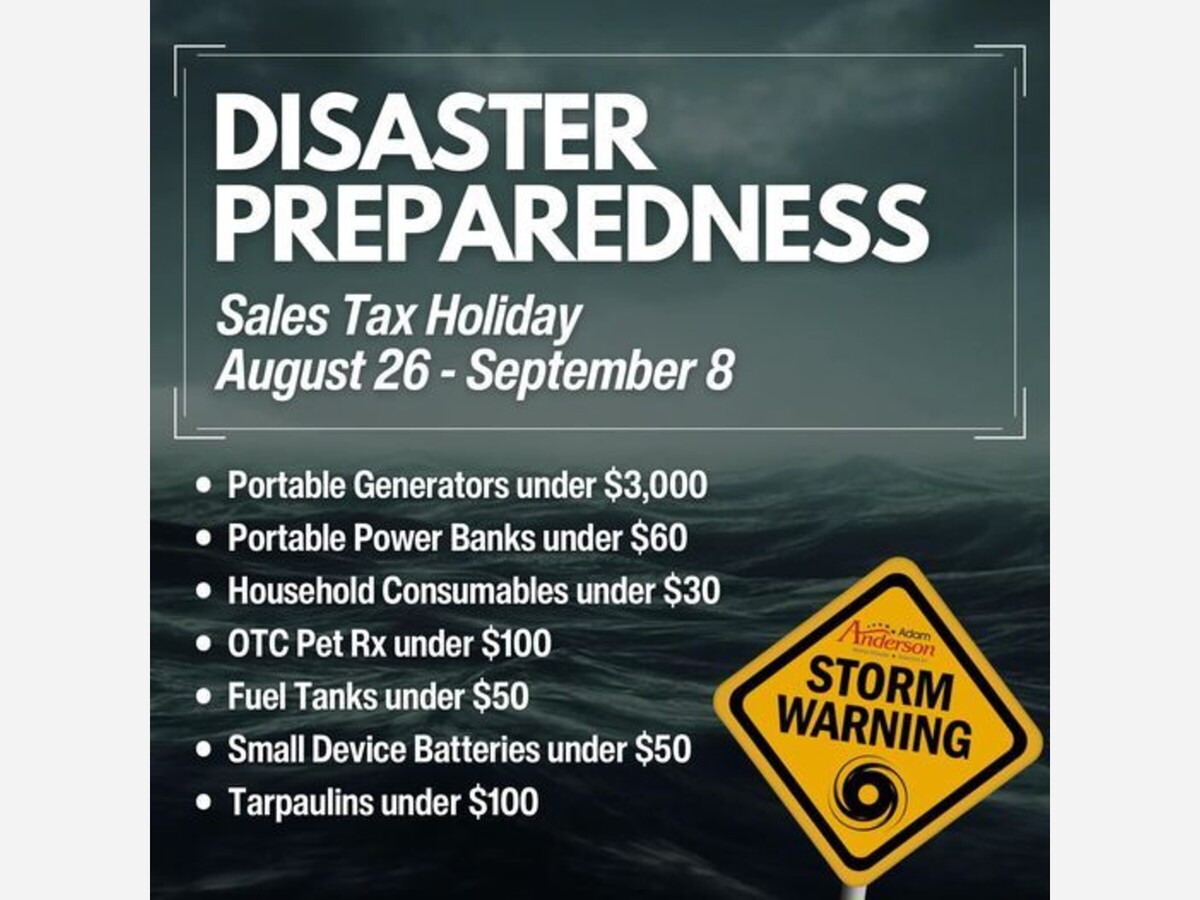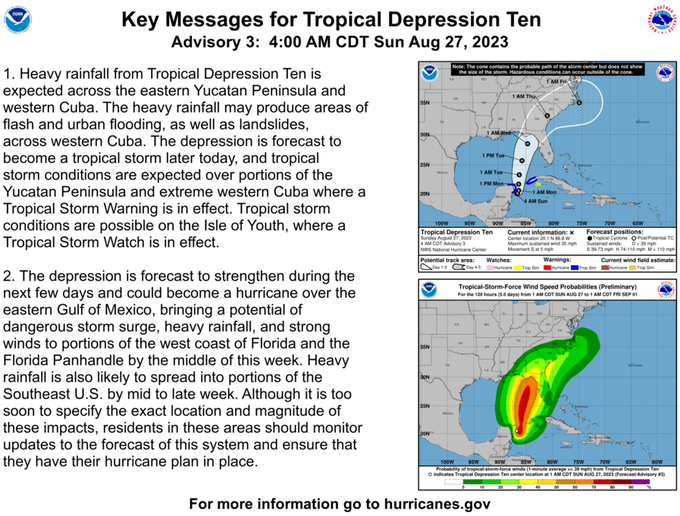Image

Denis Phillips is one of the best meteorologists I have ever had the pleasure to listen to. He's with ABC Action News in the Tampa Bay area. Even though Tidings has the Tidings TideWatch Storm Center powered by AccuWeather and we're an NOAA Weather Ready Nation Brand Ambassador, we still keep one channel tuned to Denis Phillips for his analysis of storm models for the Tampa Bay area. We will also check out Mike's Weather Page, as even though Mike is not a classically trained meteorologist, he has more insight and study than anyone else on storm tracking. So, watch for updates from Tidings, Denis Phillips and Mike's Weather Page if you are in the Tampa Bay area.
Here is the latest on the information we get from the National Hurricane Center to the Tidings TideWatch Storm Center.

We will see hurricane watches as early as TONIGHT (Sunday night) or Monday morning. We are still in the BEST CASE opinion. At Tidings, from everything we've seen so far this is going to go North West of us, but that is just a GUESS like everyone else's. So, keep watching. Denis Phillips Rule#7 applies. See below.
We all know the Rule #7 from Denis Phillips. What are the rest of the rules? Here you go :
1. Storm track errors past 3 days can be HUGE. Don't get caught up on forecasts that far out. You'll go crazy.
2. Models flip flop back and forth all the time. Look for trends, don't look at individual model runs
3. If you didn't prepare in June (which you probably didn't), do so now. Check your hurricane kit and guide to see what YOU and your family need.
4. Don't freak out.
5. Don't freak out. Ok? We live in Florida. It goes with the territory. The odds of a storm affecting us directly is usually low.
6. If things get bad, KNOW that we will be there will you 24-7. You're going to hear a ton of information. It can get confusing. Stick with us. We won't steer you wrong.
7. Stop freaking out....until I tell you to. We're fine.
And, because we don't give you just the bare minimum, here's Denis Phillips list of how his family prepares for any incoming storm:
1. Charge any device that provides light. Laptops, tablets, cameras, video cameras, and old phones. Old cell phones can still used for dialing 911. Charge external battery back ups. ( Glow sticks also provide light for a few hours. Stand them upright in a glass or jar to make a lantern.)
2. Wash all trash cans, big and small, and fill with water for flushing toilets. Line outdoor trash cans with trash bags, fill with water and store in the garage. Add bleach to sterilize.
3. Fill every tub and sink with water. Cover sinks with Saran Wrap to keep it from collecting dust. Fill washing machine and leave lid up to store water.
4. Fill old empty water bottles and other containers with water and keep near sinks for washing hands.
5. Fill every Tupperware with water and store in freezer. These will help keep food cold longer and serve as a back up water supply.
6. Fill drinking cups with water and cover with Saran Wrap. Store as many as possible in fridge. The rest you can store on the counter and use first before any water bottles are opened. Ice is impossible to find after the storm.
7. Reserve fridge space for storing tap water and keep the sealed water bottles on the counter.
8. Cook any meats in advance and other perishable foods. You can freeze cooked food. Hard boil eggs for snacks for first day without power.
9. Be well hydrated before the storm hits and avoid salty foods that make you dehydrated.
10. Wash all dirty clothes and bed sheets. Anything dirty will smell without the A/C, you may need the items, and with no A/C, you'll be sweating a lot. You're going to want clean sheets.
11. Toss out any expiring food, clean cat litter boxes, empty all trash cans in the house, including bathrooms. Remove anything that will cause an odor when the A/C is off. If you don't have a trash day pickup before the storm, find a dumpster.
12. Bring in any yard decor, secure anything that will fly around, secure gates, bring in hoses, potted plants, etc. Bring in patio furniture and grills.
13. Clean your environment so you have clear, easy escape routes. Even if that means temporarily moving furniture to one area.
14. Scrub all bathrooms so you are starting with a clean odor free environment. Store water filled trash cans next to each toilet for flushing.
15. Place everything you own that is important and necessary in a backpack or small file box that is easy to grab. Include your wallet with ID, phone, hand sanitizer, snacks, etc. Get plastic sleeves for important documents.
16. Make sure you have cash on hand.
17. Stock up on pet food and fill up bowls of water for pets.
18. Refill any medications. Most insurance companies allow for 2 emergency refills per year.
19. Fill your propane tanks. You can heat soup cans, boil water, make coffee, and other stuff besides just grilling meat. Get an extra, if possible.
20. Drop your A/C in advance and lower temperatures in your fridges.
21. Gather all candles, flashlights, lighters, matches, batteries, and other items and keep them accessible.
22. Clean all counters in advance. Start with a clean surface. Buy Clorox Wipes for cleaning when there is no power. Mop your floors and vacuum. If power is out for 10 days, you'll have to live in the mess you started with.
23. Pick your emergency safe place such as a closet under the stairs. Store the items you'll need in that location for the brunt of the storm. Make a hand fan for when the power is out.
24. Shower just before the storm is scheduled to hit.
25. Keep baby wipes next to each toilet. Don't flush them. It's not the time to risk clogging your toilet!
26. Run your dishwasher, don't risk having dirty smelly dishes and you need every container for water! Remember you'll need clean water for brushing your teeth, washing yourself, and cleaning your hands.
27. Put a small suitcase in your car in case you decide to evacuate. Also put at least one jug of water in your car. It will still be there if you don't evacuate! You don't need to store all water in the house. Remember to pack for pets as well.
28. Check on all family members, set up emergency back up plans, and check on elderly neighbors.
29. Remember, pets are family too. Take them with you!
30. Before the storm, unplug all electronics. There will be power surges during and after the storm.
31. Gas up your car and have a spare gas container for your generator or your car when you run out.
32 . Use plastic cups and paper plates.
33 . Also if you run out of water tap your hot water heater it can have up to 30 gallons stored in there.
34 . Put water in balloons and store in freezer.
35 . If it's yellow let it mellow, if it's brown Flush it down.

If you can, take a video of your house and contents....walk room to room--open cabinets/drawers and closets. This will help if you need to make a claim later. It will show proof of items and help you list all the items (help your memory, so you don't forget anything)...I highly recommend!!!I also heard you should freeze a cup of water, place a coin on top after it is frozen...keep this in your freezer to help you gauge the temperature if the power goes out. If the coin stays on top, the food is staying frozen. If the coin falls into the water, the freezer thawed out and most food will likely need to be thrown away. This is super helpful is you have to leave and come back, as it may appear everything is still frozen, but if the coin is in the cup--you will know!!
Finally, anything that you want to try and preserve, but you can't take with you---place it in a plastic bin and put in your dishwasher, lock the door---this should make it water tight in case of any water intrusion into your home. But of course, take all the important/irreplaceable items you can!!
